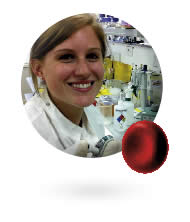
Claire Hadrill
Menzies Research Institute
Development and degeneration of the brain
Did you know that the brain is made up of about 100 billion nerve cells? And that every one of these cells can connect with about 7000 other nerve cells? All these connections enable the brain to control everything that we do, from thinking and planning, to doing and achieving. My name is Claire Hadrill, and I study the development and degeneration of the brain.
Science has always interested me, and as a kid I can remember collecting lots of peculiar ingredients and making strange colored, and often foul smelling concoctions to cure people of nonexistent diseases! This fascination with making things, coupled with my interest in the human body led me to undertake a Bachelor of Medical Research at the University of Tasmania. After completing my degree, I decided to continue with medical science and undertake an Honours project at the Menzies Research Institute.
I am part of a team that researches how the brain forms all those billions of connections, and how those connections are disrupted in neurodegenerative diseases (diseases that result in the progressive loss of structure or function of neurons) like Alzheimer's disease (involving loss of memory and cognition). The key to these processes is calcium: but not the kind of calcium that we get from milk to make our teeth and bones strong. This kind of calcium is called ionic calcium and it is a very small, positively charged molecule. All the cells in the brain use this kind of calcium to communicate with each other and perform complex processes like learning and memory. When calcium is disrupted in the brain, the cells can no longer communicate and so processes like memory are disturbed. My project specifically looks at how calcium is controlled as the brain develops, and how it may be disrupted in brains affected by Alzheimer's disease.
 Science is a fantastic career for anyone who enjoys learning and discovering. My favorite part about science is the excitement that you feel when you discover something that no one else in the world knows. As a medical scientist, I aim to work in many different places around the world and hopefully make some important contributions to our knowledge of the human brain.
Science is a fantastic career for anyone who enjoys learning and discovering. My favorite part about science is the excitement that you feel when you discover something that no one else in the world knows. As a medical scientist, I aim to work in many different places around the world and hopefully make some important contributions to our knowledge of the human brain.
Find out more about the Menzies Research Institute at www.menzies.utas.edu.au
